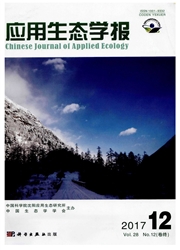

 中文摘要:
中文摘要:
Bt蛋白能通过转Bt基因作物的秸秆还田进入土壤,进而可能会对土壤动物如蚯蚓的生长发育和生殖造成影响.为评估Bt水稻对赤子爱胜蚓的影响,本文模拟秸秆还田,在土壤中添加2.5%、5%、7.5%和10%Bt水稻(b2B138)及其同源水稻(安丰A)秸秆,分别在饲养赤子爱胜蚓7、15、30、45、60、75和90 d后观测蚯蚓的存活率、相对生长率和生殖情况,以及秸秆土壤混合物和蚯蚓体内的Cry1Ab蛋白含量.结果表明:较高还田量(7.5%和10%)Bt水稻秸秆处理对赤子爱胜蚓存活率有抑制作用;Bt水稻秸秆还田对赤子爱胜蚓的相对生长率没有不利影响;还田量为5%、7.5%和10%时,Bt水稻秸秆还田能促进蚯蚓的生殖.酶联免疫吸附测定法(ELISA)结果表明:在Bt水稻土壤混合物中,蚯蚓体内均能检测到Cry1Ab蛋白,且前者随着时间延长而显著减少.因此,还田量为2.5%和5%时,Bt水稻秸秆还田释放的Cry1Ab蛋白对赤子爱胜蚓的生长发育和生殖没有不利影响.
 英文摘要:
英文摘要:
Bacillus thuringiensis (Bt) protein can enter the soil through Bt crops straw returning to field, which may affect the growth and reproduction of soil animals, such as earthworms. Here, Bt rice (b2B138) and conventional rice (Anfeng A) straw were returned in soil to evaluate the impact of Bt rice on Eisenia fetida. Two varieties of rice straw were added into soil to breed E. fetida at the rates of 2.5%, 5%, 7.5% and 10%. The survival rate, relative growth rate, reproduction of earthworm, the CryiAb content in soil-straw mixture and earthworm were detected after 7, 15, 30, 45, 60, 75, 90 d. The results showed that Bt rice straw returning at higher concentrations (7.5% and 10%) inhibited the survival rate of E. fetida. Bt rice straw returning had no adverse effect on rela- tive growth rate (RGR) of E. fetida. Bt rice straw treatment improved the reproduction of earth- worms under 5%, 7.5% and 10% straw returning in soil. Enzyme-linked immunosorbent assay (ELISA) results indicated that immunoreactive CrylAb was detectable in soil-straw mixture and E. fetida from Bt rice treatments, and a strong decline was observed in soil-straw mixture with the in- crease of treated time. Therefore, CrylAb released from Bt rice straw returning at 2.5% and 5% concentration had no adverse effects on the growth and reproduction of E. fetida.
 同期刊论文项目
同期刊论文项目
 同项目期刊论文
同项目期刊论文
 Effects of cultivation and return of Bacillus thuringiensis (Bt) maize on the diversity of the arbus
Effects of cultivation and return of Bacillus thuringiensis (Bt) maize on the diversity of the arbus 期刊信息
期刊信息
